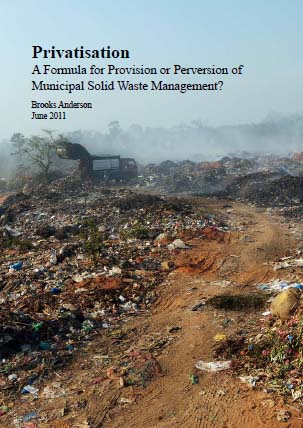
In 2000, in response to a Supreme Court order, the Government of India formulated and enacted the Municipal Solid Wastes (Management and Handling) Rules (hereafter referred to as the Rules) to mitigate a burgeoning solid waste crisis. Pollution from haphazard municipal solid waste disposal was gravely jeopardizing public health, thereby undermining the nation’s development gains.
The Rules’ prime objective was to protect public health and the environment by minimizing disposal of waste in landfills, thereby aligning the government’s municipal waste management policy with its commitments to international treaties to reduce greenhouse gas emissions, control the production of persistent organic pollutants, conserve finite resources, and achieve broad development targets.

Karvadikuppam Dumpyard, Pondicherry
This paper argues that India’s solid waste crisis is now worse than ever because, rather than earnestly implementing and enforcing the Rules, the government instead instituted a policy of privatising solid waste management, a policy promoted aggressively by the World Bank and USAID. Privatisation of MSWM is demonstrating detrimental environmental and public health consequences.
Hence, this paper examines the rationale for privatisation, reviews the findings of studies of privatisation, and presents the impacts of privatised MSWM in three Indian cities - Bangalore, Chennai and Pondicherry to assess whether privatisation is an appropriate instrument for solving the solid waste crisis.
Three major findings emerge from this study:
- Privatisation’s objectives diverge distinctly from the government’s objectives: Privatisation’s objective is to transfer public money, work and assets to the private sector, which strives to maximize profit. In the case of municipal solid waste management, such objectives do not serve the government’s objectives and obligations, particularly to safeguard public health and protect the environment by minimizing waste.
- Rather than improving public service performance, privatisation unleashes a plethora of undesirable outcomes: Privatisation creates incentives that undermine the Rules’ objective of minimizing waste. Studies of privatisation in other countries have declared privatised services at best no more efficient than the public alternative, and sometimes worse. Scholars have found instances in which user tariffs after privatisation went up rather than down, and of clients locked into contracts that set prices considerably above market rates. Governments were distressed that, rather than creating greater cost control, privatisation considerably diminished their ability to control costs as it led to monopolistic markets and contractors dictated prices. One finding is especially alarming: privatisation’s problems and governments’ efforts to rescue privatised services have hampered nations’ efforts to achieve the Millennium Development Goals.
- There is increasing evidence that administrative reforms can dramatically improve municipal solid waste management service: On the basis of these findings, this paper recommends that the government retain public control over its waste management duties, and institute administrative reforms to vigorously implement and enforce the MSW Rules.
Download the report here -





 Privatisation_Municipal_Solid_Waste_Management_Brooks_Anderson_2011.pdf
Privatisation_Municipal_Solid_Waste_Management_Brooks_Anderson_2011.pdf







